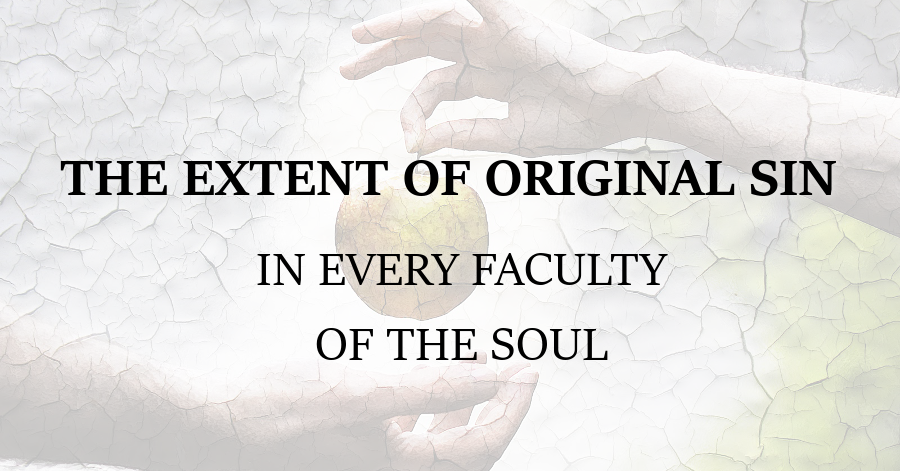
Ephesians 4:17-24Anthony Burgess,This I say therefore, and testify in the Lord, that ye henceforth walk not as other Gentiles walk, in the vanity of their mind, 18 Having the understanding darkened, being alienated from the life of God through the ignorance that is in them, because of the blindness of their heart: 19 Who being past feeling have given themselves over unto lasciviousness, to work all uncleanness with greediness. 20 But ye have not so learned Christ; 21 If so be that ye have heard him, and have been taught by him, as the truth is in Jesus: 22 That ye put off concerning the former conversation the old man, which is corrupt according to the deceitful lusts; 23 And be renewed in the spirit of your mind; 24 And that ye put on the new man, which after God is created in righteousness and true holiness.
Treatise on Original Sin,
Part 3, chapter 1, sections 1-3.
Concerning our subject of original sin, these particulars have been largely treated on, namely, that it is, what it is, and how it is communicated. The next thing therefore in our method to be considered, is, the subject of inhesion, wherein it is, in what part it doth reside, and what powers of the soul are corrupted by it. There is indeed made by divines a twofold subject of original sin [the persons, and the faculties of the soul].
Of predication, the persons in whom it is affirmed to be, and that is in all who naturally come of Adam, Christ only is excepted. And in this there is not much controversy, only the Franciscan Papists opposing the Dominicans, do hotly contend, that the Virgin Mary was by special privilege exempted from original sin. Scotus seemeth to be the first, that made it received as a kind of an Ecclesiastical opinion, whereas formerly it was but thought doubtful, or at most probable. It is not worth the while to trouble you with this, and I may have occasion ere the subject be dispatched to say what will be necessary to it.
Original Sin in Ephesians 4I shall therefore proceed to that which is more practical and profitable, even to search into the seat and bowels of this original sin, that we may be fully informed, no part of the soul is free from this pestilence. To which truth the text in hand [Ephesians 4] will contribute great assistance.
No Part of the Soul is Free From Original SinFor the coherence of it briefly take notice that the Apostle in Ephesians 4:17 giveth a short but dreadful description of a Gentile conversation, or the life of one without the knowledge of Christ, “that ye henceforth walk not as other Gentiles walk, in the vanity of their mind.” Wherein you may observe a threefold ignorance or blindness upon all such, so impossible is it that of themselves they should ever come to see. There is 1) a natural blindness, 2) a voluntary contracted blindness, and 3) a judicial blindness inflicted on them by God, for abuse of natural light. These there are mentioned in the 18th verse. And in verse 19 we have the formidable consequence declared, that being past feeling, no remorse of conscience in them, they give up themselves to all wickedness with greediness.
Oh, that this were only among Pagans! But how many have this natural, voluntary, and judicial blindness and obstinacy upon them under the light of the Gospel? Yea, their eyes are more blinded, and hearts more hardened, where the means of grace have been contemned, than in the places where the name of Christ hath not been known. This black condition of Heathens being described, he compares those of Christians with it, and so we have darkness and light here set together. And this the Apostle declares, verse 20, “But ye have not so learned Christ.” Christ teaches no such wickedness, yet because many may have a bare knowledge, and a vain empty profession of Christ, and live such Pagan lives, he adds a corrective to his speech, which is worthy of all attention, “If so be that ye have heard him, and have been taught by him, as the truth is in Jesus.” (Eph. 4:21).
This is an excellent limitation, men may know Christ, profess Christ, and yet not do it, as the truth is in Jesus; that is, not to obey the doctrine of Christ as he hath commanded. Christ never required that thou shouldst only make a profession of faith in him, and then for thy life to be full of vice and corruption, know, if you do so, you know not the truth as it is in Jesus Christ. We have a like expression in Colossians 1:6 where the godly are said, to know “the grace of God in truth,” and Titus 1:1 there is “the acknowledging of the truth after godliness.“
Oh, let such hear, and let their ears tingle, and their hearts tremble, who come to Church, profess Christ, and yet run in all excess of riot! What doth any knowledge profit if it be not of the truth as it is in Jesus, if it be not an acknowledgment after godliness, thou deniest the faith, and art indeed worse than a Heathen? There is theologia rationalia and experimentalis [rational and experimental theology], as Gerson, or theologia docens and utens [doctrinal and practical theology]. It is this latter, namely, an exercised experimental divinity, that maketh a divine properly. Therefore, Amesius’ definition of theologia is good, that it is doctrius Deo vivendi, a doctrine whereby we are taught to live unto God. Every wicked Christian is worse than a Pagan; But who will believe this report?
Now that we may know what it is to know truth as it is in Jesus, he instanceth in a twofold effect or demonstration thereof:
The first is, “That ye put off concerning the former conversation the old man, which is corrupt according to the deceitful lusts” (Eph. 4:22). This “old man” you heard is original sin, which must be mortified with the immediate issues thereof. A true knowledge of Christ doth not only cleanse the streams, but the fountain also, doth not only change the conversation of a man, but the heart, the affections, the whole man. It goeth to the root as well as the branches.
And the second effect is in the text, “And be renewed in the spirit of your mind” (Eph. 4:23), wherein we are to observe the duty and the subject of it.
1. The duty is “to be renewed.” We read it imperatively, but in the Greek, it is the infinitive mood, as also the duty to put off, mentioned in verse 22, is in the same mood. These infinitives relate to the verb [“taught“]: being taught “as the truth is in Jesus” (v. 21), to be taught “to put off” (v. 22), to be taught “to be renewed” (v. 23). If so be we conceive of those to whom Paul writeth, as converted already, then this duty of renovation is to be understood of further increased and degrees. To be more renewed every day, for it is usual with the Apostle to write to those who are supposed to be in the state of grace, that they should be more sanctified and reconciled to God. “To be renewed,” is to have the mind endowed with new properties and qualities. For ignorance, knowledge; for atheism and unbelief, faith; for sinful and vain thoughts, gracious and holy ones, etc.
So that there are two extreme errours in the expounding of this:
A. Of the Illyricans, who as they held sin to be the substance of a man, so this renovation they must hold to be substantial, not accidental. But it’s absurd to say a man must have a new soul essentially in regeneration.
B. The other extreme is of Socinians, for they hold that there is no such thing as original sin, they must needs say, that this renovation is only in regard of contracted sin, and external impiety in the life, not in respect of any inbred and inherent pollution in the mind: But this also is against the Scripture.
2. The second thing in the text, is the subject of this renovation, “the spirit of your mind.” Concerning the difference between spirit and mind, many thoughts have been, but either it is a Hebraism, and is no more than the mind which is a spirit, or else spirit is taken for that which is the most sublime, noble, and most active and vigorous in a man. Thus, in Job 20:3 we have “the spirit of understanding,” And Isaiah 11:2, “the spirit of wisdom,” “the spirit of counsel,” and “the spirit of knowledge.” Yea, it is sometimes applied to the vigorous and high acts of evil, as “The spirit of whoredom” (Hosea 4:12), and “the spirit of whoredoms” (Hosea 5:4). So that when the Apostle doth not say, “be renewed in your mind,” but “in the spirit of your mind,” this supposeth that what is most choice, excellent, and noble, even in the rational part of a man, called for its dignity, yet this is all over polluted by original sin, and so needeth a renovation: As for those who by the spirit would understand the Holy Ghost, that is most absurd, for how can we be renewed in that?
SECT. II.
The text thus opened, we may see two doctrines in the womb of it, the first implied and supposed, namely:
The former doctrine is only to my subject in hand; for now my work is to show you, wherein this contagion doth discover itself. And I shall begin with that which hath the greatest dignity in a man, and if that hath not escaped pollution, much less may we think the other parts have. And if the eye be dark, how great must our darkness be? And before we speak particularly to that, let us say something in the general about the subject wherein this original sin is seated.
SECT. III.
Errors Regarding the Seat of Original SinFirst, there hath been some, who have not so much seated it in the soul, as made the very soul and substance of a man to be original sin; So that we might properly and truly say that man was sin itself. The author of this was Flacius Illyricus, who in many things is to be praised for his diligence and industry, but he was of a turbulent spirit, very restless; insomuch that in his studies at first, he was so greatly tempted, that many times public prayer was made for him in the solemn Assemblies. This man out of great earnestness to oppose Papists, yea and the Lutheran Strigelius, who extenuated original sin, fell into another extreme, making it to be the very substance of man. It is true, some have excused him, as thinking his opinion was sound, only his words were obscure and dangerous, for he doth often distinguish between the Homo Physicus and the Homo Theologicus, he maketh the theological man, as he is in such a consideration to be only sinful. But surely it is as easy to understand Epicurus his atoms, Pythagoras his numbers, Plato’s ideas, Aristotle’s entelechies, as Illyricus his homo theologicus in the way he layeth it down, denying all along, that original sin is an accident. This opinion made a great rent among the Lutherans, whereof some were called Substantiarii, others Accidentarii, as Coceius the Papist relateth (Coccius Thes. de peccato).
But this is to be refused with great indignation. Original sin is most intimately cleaving to us, inseparably joined to the nature of man, yet it is not the nature of man, for then Christ could not have taken our nature without sin. Though therefore it be seated in the soul, and that most tenaciously, yet it is not the essence of a man: But of this more in its time.
Secondly, it is also a great dispute among the Schoolmen, whether original sin be immediately and proximally seated in the essence of the soul, or in the powers of it? Whether because it is first in the essence of the soul, therefore the understanding and will are corrupted? Or, whether these powers are first polluted and infected by it? But this is founded upon a philosophical dispute, whether the soul and the faculties thereof are distinguished: And therefore, I shall not trouble you with it.
Thirdly, Some Papists have limited original sin only to the affections, to the inferior and sensitive part of a man, as if sin were not in the understanding, and reason at all, but in the affections and fleshly part only. But the more learned of the Papists gainsay this, and do acknowledge, that the mind as well as other parts is polluted with this leprosy.
These things premised, let us consider wherein original sin hath infected the minds of all men, so that in respect thereof that is to be renewed…
Advertisements Share this:




